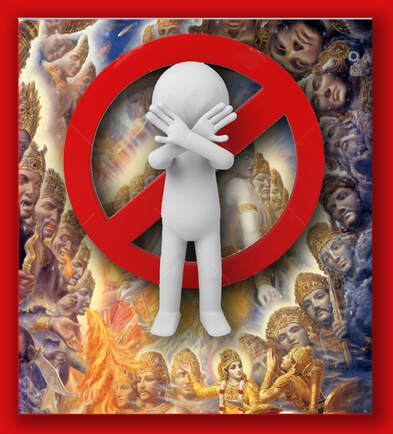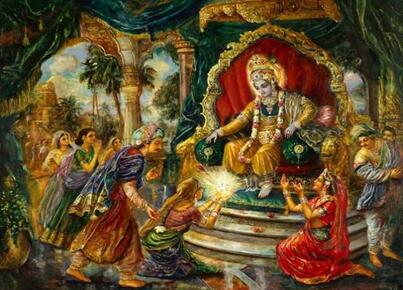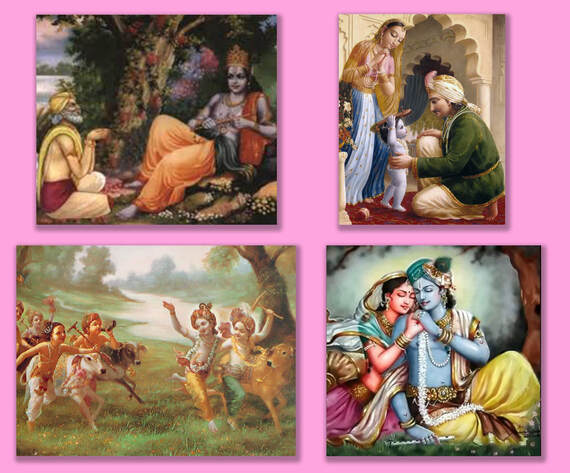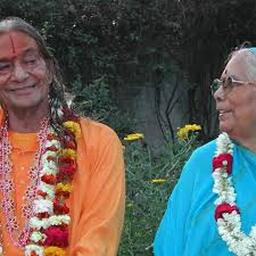Don't Worship "God" |
 Don't love "God"
Don't love "God"
If NOT God who else should be worshiped?
This is a contentious question. So, let us answer this question based on the philosophy explained by the fifth original Jagadguru Shri Kripalu Ji Maharaj, who was honored with the title of Jagadguruttam (greatest of all Jagadgurus) by the prestigious assembly of 500 most learned scholars of Kashi Vidwat Parishat. Shri Kripalu Ji Maharaj, lovingly known as Shri Maharaj Ji by his devotees, proclaims, “If you are serious about performing true devotion to the lotus feet of the God, stop worshiping God”.
That raises a big question - if we do not worship God, who should we worship? The celestial-beings (devi-devatas)? No, never! They are material beings just like us, different only in the fact that they are endowed with superior knowledge and special powers but those are limited. Moreover, they suffer from the same mental afflictions including anger, passion, greed, jealousy, hatred etc., as we human beings do.
This raises an even bigger question - if we are expected to worship neither God nor the celestial beings, that leaves only two other entities - humans or demons. Should we worship humans or demons? No, absolutely not!
Shri Maharaj Ji says, offer your devotion to the lotus feet of Shri Krishna.
This is a contentious question. So, let us answer this question based on the philosophy explained by the fifth original Jagadguru Shri Kripalu Ji Maharaj, who was honored with the title of Jagadguruttam (greatest of all Jagadgurus) by the prestigious assembly of 500 most learned scholars of Kashi Vidwat Parishat. Shri Kripalu Ji Maharaj, lovingly known as Shri Maharaj Ji by his devotees, proclaims, “If you are serious about performing true devotion to the lotus feet of the God, stop worshiping God”.
That raises a big question - if we do not worship God, who should we worship? The celestial-beings (devi-devatas)? No, never! They are material beings just like us, different only in the fact that they are endowed with superior knowledge and special powers but those are limited. Moreover, they suffer from the same mental afflictions including anger, passion, greed, jealousy, hatred etc., as we human beings do.
This raises an even bigger question - if we are expected to worship neither God nor the celestial beings, that leaves only two other entities - humans or demons. Should we worship humans or demons? No, absolutely not!
Shri Maharaj Ji says, offer your devotion to the lotus feet of Shri Krishna.
Now we are totally lost - we know Shri Krishna is God. On the one hand we are being asked not to worship God and on the other we are being asked to offer devotion to Shri Krishna who is none other than God himself. This is getting to be too confusing.
 The subjects in Dwarka knew their ruler was God Shri Krishna and they behaved accordingly.
The subjects in Dwarka knew their ruler was God Shri Krishna and they behaved accordingly.
So, let us understand this point through philosophy -
God is called Bhagavan in Sanskrit. The Sanskrit word Bhagavan is made up of 2 words
And Shri Krishna possesses all of these 6 bhag. So there is no doubt that He is Bhagavan, the supreme divine personality.
Shri Maharaj Ji explains in detail about these six bhag (majesties) of Shri Krishna, yet he warns us against worshiping “Bhagavan” Shri Krishna. Instead He says, a devotee must establish a loving relationship with Shri Krishna. It is to be noted that Shri Maharaj Ji is not recommending to abandon God, rather he is saying, worship Shri Krishna with loving sentiments i.e. love Shri Krishna.
God is called Bhagavan in Sanskrit. The Sanskrit word Bhagavan is made up of 2 words
- Bhaga (भग): 6 limitless majesties (See Bhagavan-Shri Krishna Article)
- Van (वान): The beholder
And Shri Krishna possesses all of these 6 bhag. So there is no doubt that He is Bhagavan, the supreme divine personality.
Shri Maharaj Ji explains in detail about these six bhag (majesties) of Shri Krishna, yet he warns us against worshiping “Bhagavan” Shri Krishna. Instead He says, a devotee must establish a loving relationship with Shri Krishna. It is to be noted that Shri Maharaj Ji is not recommending to abandon God, rather he is saying, worship Shri Krishna with loving sentiments i.e. love Shri Krishna.
 When the same Judge reaches home, he becomes an ordinary householder - a caring son, loving husband, a doting father and empathetic friend.
When the same Judge reaches home, he becomes an ordinary householder - a caring son, loving husband, a doting father and empathetic friend.
Let us understand this with an example. Let’s say there is a very powerful and popular Chief Justice in the Supreme Court, who is highly respected and regarded by his employees and residents of the state. That Justice is also a family man who has friends and a loving mother, wife, children at home. When he is at work, all his employees respect him and perform all their duties diligently and carefully, fearful of incurring his displeasure in case of negligence. When the same person reaches home, he becomes an ordinary householder - a caring son, loving husband, a doting father and empathetic friend. Though he is the big boss with immense authority over his staff in the office, yet if he were to show that authoritarian style (that he has at the office) to his family members at home, he would be the most unpopular and unloved person in the family.
In the same way, many devotees worship the majestic form of Shri Krishna, also known as MahaVishnu or Paramātmā. MahaVishnu is the epitome of glory and commands reverence and worship in the hearts of the devotees, but the devotees cannot associate with Him in a loving and intimate manner. This mode of worship is called Shant Bhav (distant relationship); so distant that rasik saints do not even consider it to be a ras (रस) or nectar of devotion. His divine majesty creates a sense of formality and induces fear in the hearts of the devotees. According to rasik saints ras starts at dasya bhav (servitude) where the divinity of God is forgotten.
In the same way, many devotees worship the majestic form of Shri Krishna, also known as MahaVishnu or Paramātmā. MahaVishnu is the epitome of glory and commands reverence and worship in the hearts of the devotees, but the devotees cannot associate with Him in a loving and intimate manner. This mode of worship is called Shant Bhav (distant relationship); so distant that rasik saints do not even consider it to be a ras (रस) or nectar of devotion. His divine majesty creates a sense of formality and induces fear in the hearts of the devotees. According to rasik saints ras starts at dasya bhav (servitude) where the divinity of God is forgotten.
 Worshiping Shri Krishna with these four bhavs
Worshiping Shri Krishna with these four bhavs
That is why Shri Maharaj Ji advises us to simply forget that Shri Krishna is Bhagavan and love Him with any of the four devotional sentiments of love called bhav. These relationships provide an increasing level of proximity and intimacy with Shri Krishna than the previous one:
Our Vedas say that Shri Krishna is both the honey and the honey bee. He is as sweet as honey, and He distributes that love and sweetness amongst His devotees and in turn enjoys His own nectar through His devotees, who are drenched in the nectar of His divine association.
So, in a nutshell
- Dasya Bhav (दास्य भाव): Feeling of serving the master
- Sakhya Bhav (सख्य भाव): Feeling of friendship
- Vatsalya bhav (वात्सल्य भाव): Feeling of paternal love
- Madhurya Bhav (माधुर्य भाव): Feeling of lover and beloved
Our Vedas say that Shri Krishna is both the honey and the honey bee. He is as sweet as honey, and He distributes that love and sweetness amongst His devotees and in turn enjoys His own nectar through His devotees, who are drenched in the nectar of His divine association.
So, in a nutshell
हरि ते ना कभु डरना, उन्हें अपना ही मानना ॥
hari te nā kabhu ḍaranā, unheṃ apanā hī mānanā ॥
hari te nā kabhu ḍaranā, unheṃ apanā hī mānanā ॥
So, we must put aside His glory, magnificence and divinity along with all the formality, fear and decorum associated with his divinity and remain absorbed in the sweet sentiments of love for Him, just like the Gopis of Braj.




